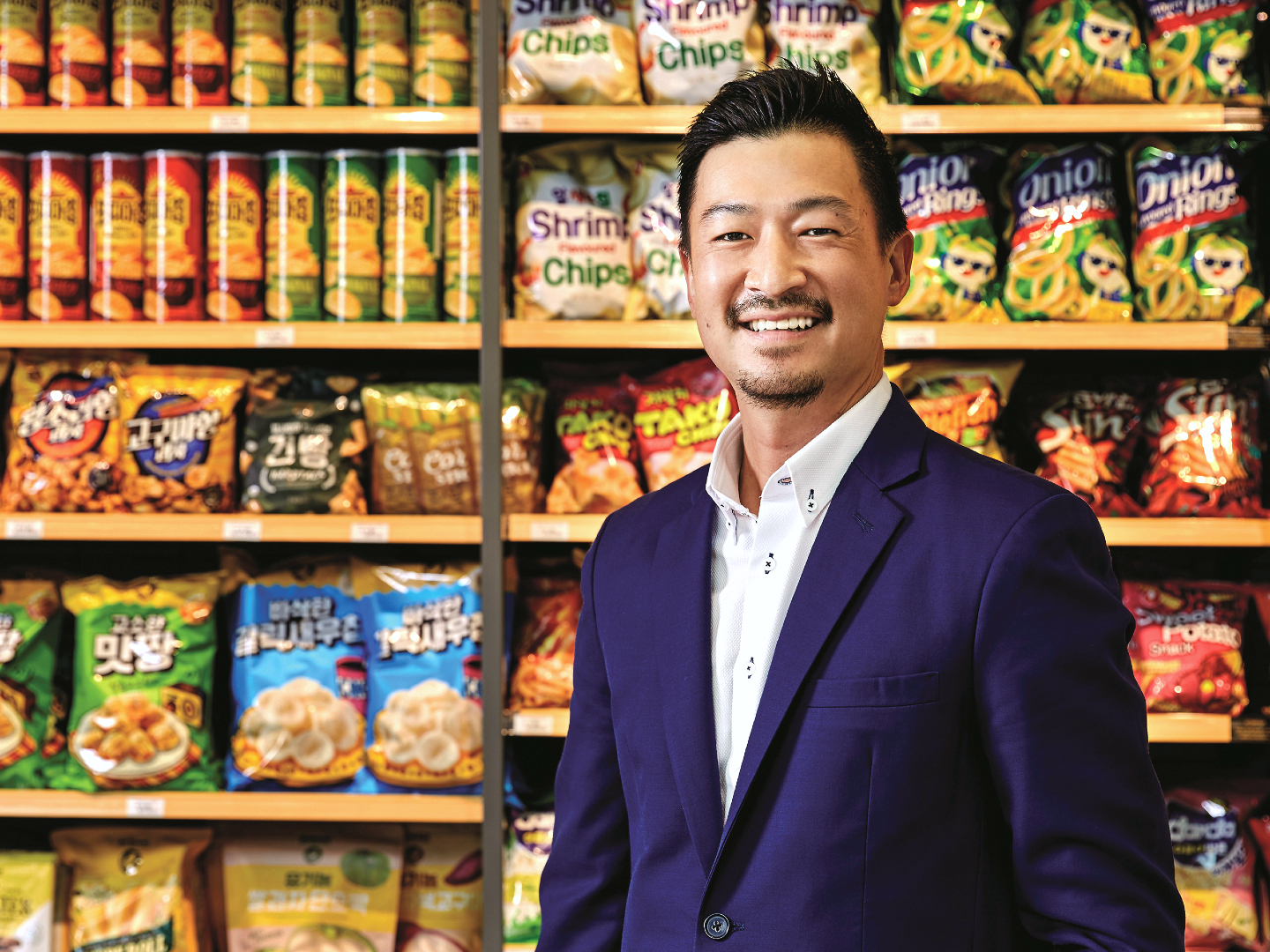
Pang signed a master franchise agreement with gigantic South Korean retailer Shinsegae Group to open its first emart24 convenience store franchise outside the country (Photo: Soophye)
Think of Japanese convenience store franchise chain FamilyMart. Or 7-11 in some of our neighbouring countries — the extensive variety in Thailand with everything from packaged edible insects to wigs, for instance, or the bounty of onigiri, sushi and bento meals in Japan, which recently delighted the visiting Olympics entourage (CBC journalist Devin Heroux’s tweeted accounts of 7-11’s culinary offerings went viral as the locals enjoyed his unabashed enthusiasm). A well-planned convenience store goes well beyond its namesake virtue to entice customers to linger.
While observing the convenience store landscape in Malaysia, Vuitton Pang noticed that the pragmatic approach most businesses took translated to equally unsentimental transactions by customers.
“Before FamilyMart opened in Malaysia, convenience stores were seen as dingy stops to pop into for cigarettes, Panadol, bread or condoms,” he says. “The question was, why? When Malaysians travel abroad, they look forward to visiting local convenience stores in a way they wouldn’t here. It wasn’t until the establishment of foreign operators such as FamilyMart here that changed this perception entirely.”
Certain that Malaysians would appreciate more high-quality variety, Pang — yes, of the same Pang family behind Mamee-Double Decker fame — stepped back from the family business to boldly venture into uncharted waters. He signed a master franchise agreement with gigantic South Korean retailer Shinsegae Group to open its first emart24 convenience store franchise outside the country.
And just as Pang and his team readied to debut emart24 Malaysia’s flagship outlet in Bangsar South, Kuala Lumpur, Malaysian states most ravaged by Covid-19 cases went into their third lockdown. The Klang Valley was among the affected.
“We had a tough call to make but decided there’s never a perfect time to open. We went ahead with our June launch date despite the circumstances and hoped for the best,” shares Pang. “We didn’t know what to expect on opening day, whether the store would be quiet or if there would be a queue. We were surprised to see a line outside the door on the big day! It gave us confidence that we were on to something.”
shop-bs-opening-2_1.jpg
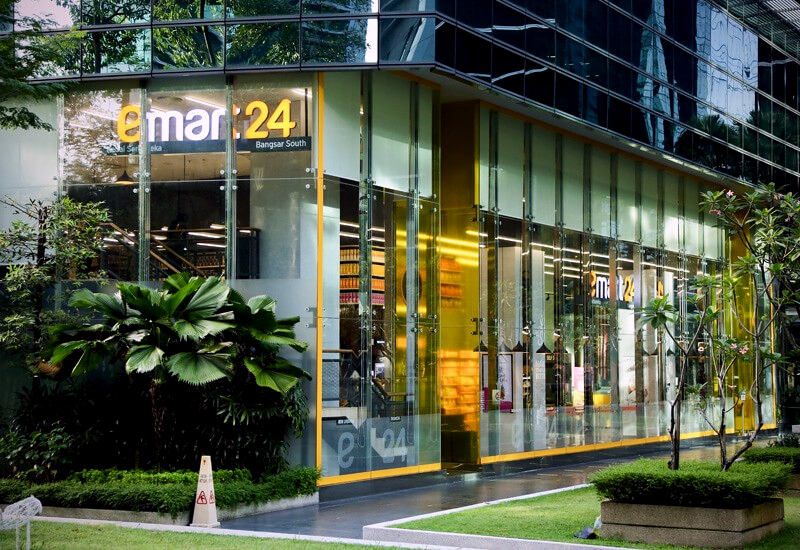
Consumer wonderland
When FamilyMart reached our shores, it did so with much fanfare. Malaysians who had encountered the brand in Japan or other countries, or recognised it from the consumption of pop culture, became unofficial ambassadors, waxing lyrical about its delicacies or treats such as the sofuto soft serve ice cream. By comparison, emart24 had a quieter brand recognition here but Pang merely saw that as an opportunity to share its story with new customers.
For the first-timer, walking through the doors of emart24 can be a heady experience. The brand redesigns the convenience store experience as a lifestyle experience, with convenience store, café and restaurant elements. Customers can pick up products exclusive to emart24, stop by for a cup of good coffee or even enjoy a full meal.
Rather than the crowded configurations of your typical convenience store, emart24 also prides itself on its spaciousness and sensorial elements. Similar to the Starbucks Reserve concept, in which reserve stores are renowned for more plush settings and higher grades of coffee, it too has general stores, such as seen in its second outlet in Desa Sri Hartamas, KL, and reserve stores, as per its Bangsar South flagship.
The latter is vastly more expansive and the senses compete to focus on the K-pop music filtering through the speakers or the intriguing aromas mingling in the air, including pastries baked fresh daily by an in-house pastry chef. The eyes, inevitably, dart across the luxe and colourful interiors to fix on the all-things-Korean section of the store, where walls are lined with snacks exclusively available to the chain and makeup by K-beauty distributor, OnlyKorea.
“It’s the fourth-largest convenience store chain in South Korea, so those who have travelled there before or who watch a lot of Korean dramas would know it,” says the CEO of the emart24 Malaysia franchise. “This is the first time emart24 has expanded outside South Korea and I have to say we are very fortunate [that] our principal has given us the autonomy to localise the experience. On top of the logistical challenges posed by Covid-19, opening emart24 took two years to organise because there were cultural considerations that had to be taken into account and accommodated.”
For instance, Malaysians by far favour hot dishes over chilled rice or similarly cold dishes — when faced with a choice, we tend to prefer food that warms both body and soul. The function of emart24 in South Korea also differs slightly from the experience coaxed here, where it is a microcosm of Korean culture through additional elements such as street food. Two driving principles of its business here are accessibility and affordability to ensure as many Malaysians as possible can partake in this experience.
Enter an innovative halal menu in the restaurant portion of the store, featuring a portable take on bibimbap called cupbap (choice of protein with condiments and cheese in a takeaway cup) for RM9.90, as well as classic street favourites such as soy garlic or sweet chili fried chicken and skewered fishcakes.
_s1a5067a_1.jpg
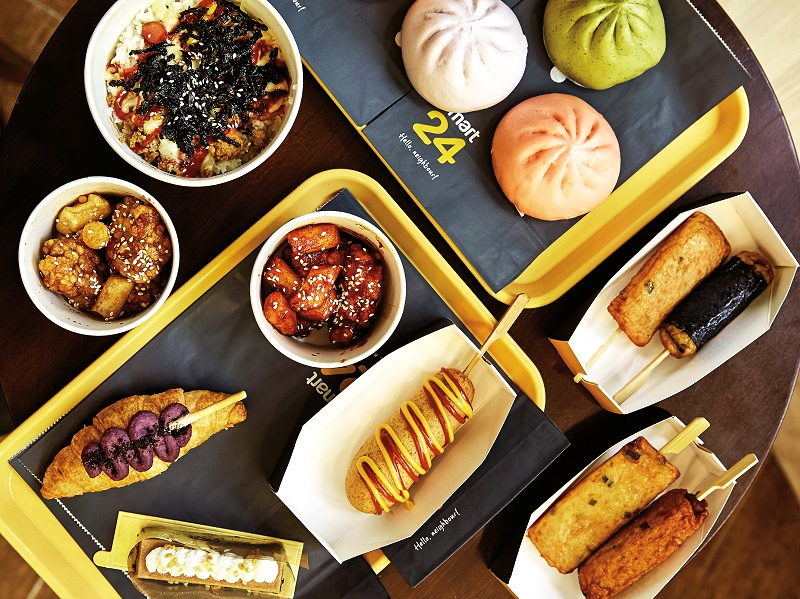
“We want to ensure the Korean identity is very much represented while meeting the local taste profile,” explains Pang. “While millennials are a key target demographic for us, this has also become a welcome taste of home for the Korean community and diaspora here. At times like these when they are not allowed to travel back to Korea, we bring the Korean experience to them.”
This emphasis on variety, quality and exclusivity would be sufficient to grant emart24 a stronghold in the convenience store scene but rife competition demands more distinctive unique selling points. Here, the brand draws from South Korea’s embrace of state-of-the-art technology.
Just as Amazon Go has made a name for itself in the US with its unmanned philosophy, using tech to guard and operate its stores, so too does emart24 in certain locations in South Korea. The pandemic accelerated the adoption of hybrid or unmanned stores as customers began to prefer the reduction of human contact offered by the smaller, autonomous premises as compared with megastores. Digital payments are de rigueur while security is enforced by virtual identity authentication via dedicated QR codes for customers.
The Korea Herald even reported the use of alcohol vending machines in select stores, powered by artificial intelligence that verifies that customers are of the legal drinking age before it allows access to the fridge. Parent company Shinsegae Group, the South Korean retail giant that owns emart24, is behind the emphasis on and access to AI technology as it believes this is the way forward for the retail landscape.
It may be some time yet before we see such features rolled out in emart24 stores here, but Pang is already looking to incorporate all possible technological elements that would increase operational efficiency and customer experience. This includes seamless payment systems, with transaction records and payments made via a single screen rather than relying on external terminals or slots — customers simply tap their debit or credit cards on the same screen that displays their list of purchases. In the works are self-checkout kiosks, which Pang hopes to unveil in the near future.
Behind the scenes
The Shinsegae Group was no stranger to Pang, who built a relationship with them while he was still a director at Mamee-Double Decker. After years of working in the family business, the intrepid entrepreneur could no longer resist the call to venture out and start his own legacy, leaving his inherited responsibility to Mamee in the safe hands of his siblings and cousins. The reputation of the Shinsegae Group and emart24 assured him of the security of this investment, while the dearth of quality options in the Malaysian convenience store industry convinced him of opportunity and untapped potential.
“Honestly, if it was a brand of any lesser repute, we might have hesitated, but emart24 was a relative newcomer to the scene that had to fight hard to compete with the incumbents. I liked its store-of-the-future positioning, both in terms of technology and how it blurred the lines between café, quick-service restaurant and convenience store,” he says.
Private equity investor Karrin Associates likewise had to be convinced of the venture’s potential for success. Principal AC Tan was quick to give his vote of confidence after due diligence.
_s1a4983a_1.jpg
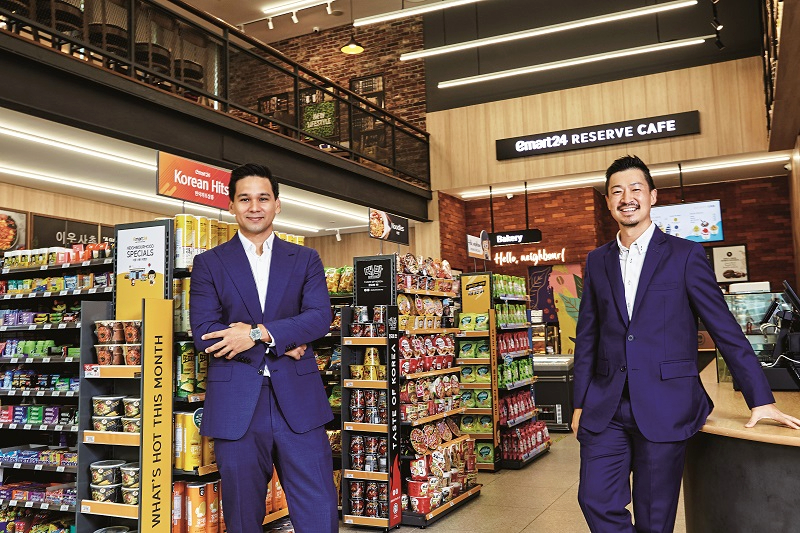
“I would say emart24 stood out against its peers in a highly competitive Korean market driven by product innovation, technology and concept, and product differentiation from traditional convenience store chains,” says Tan.
“Notwithstanding its leading position as the largest retailer in South Korea, Shinsegae Group’s strategic consolidation of large global brands like Starbucks Korea and the e-commerce platform ebay Korea it paid US$3 billion for are clear indications of its innovative spirit in getting ahead in modern retail. This, along with the strong support from the emart24 Korea team and access to a wide array of products and brands available within the Shinsegae and emart24 network, were key decision drivers in going ahead with emart24. Last but not least is the sheer commitment, spirit and proficiency of Pang as CEO, which truly resonated with us and our investors at Karrin Associates.”
One can only imagine the pitch Pang made to secure such a victory, but the numbers surely helped. Across South Korea, emart24 had 5,165 outlets as at end-2020, with more scheduled to open.
“When you look at opportunities for growth, there are two important drivers: average frequency of visits and stores per capita,” says Pang. “Think about it. How often do you go into a convenience store? Maybe once every couple of weeks to pick up cigarettes or something small that isn’t worth the hassle of going to a large grocery store or supermarket? In Korea, the average Korean walks into a convenience store three times a week. Next, stores per capita. In South Korea, a convenience store serves an average of 1,200 people. In Taiwan, it’s one store to 2,400 people, which is similar to Japan. But in Malaysia, it’s 8,000 people. I think there’s still so much room for growth here and I felt the need to immerse myself in this space and get involved.”
And he dove right in, with ambitious plans to open 300 outlets nationwide in five years. While this sounds remarkable in the Malaysian context, he interjects to say that South Korea opens close to 500 stores annually, which makes his goals positively reasonable by comparison. Extended lockdowns have, of course, impacted foot traffic, but Pang and his team adapted to the circumstances by setting up a delivery partnership with foodpanda (they are looking for a partner to handle deliveries beyond the 10km radius from stores). They have also increased social media and digital marketing initiatives to create awareness of the new chain and build pent-up demand so they will top priority lists of places to visit when restrictions are fully lifted.
“I suppose things are going as well as they could be, given the current conditions,” he muses. “It’s just too bad we can’t ride on that rush of early momentum and open more stores as quickly as we would like. Based on our observations of how laser-focused most customers are on the Korean segments of our store, with first-timers browsing for perhaps a half-hour to take it all in, I think our offerings definitely resonate with people who want to see and experience something new.”
Daring to do different
Walking away from a generational legacy must have been terrifying and exhilarating in equal measure, but Pang does not seem to have had any second thoughts.
“I have to say again that this is only possible because Mamee is in such good hands with my siblings and cousins,” he reiterates. “But I knew I had to make my own path. I will be the first to raise my hand and say I have no experience in this industry but I have been very fortunate in building a team that does, a team that is far more familiar with Korean culture — I watch the occasional K-drama but I’m far from a connoisseur — and have the know-how and experience to pull this off.”
While he relies on his team to make some of the right calls, Pang himself brings instincts honed from years of business experience to the table.
“At Mamee, we always talked about innovation, integrity and involvement. These are values I carried over with me and I hope to be able to cultivate the same culture here. In today’s world, if you are not innovative, you will quickly lose relevance, and this is particularly true of the fast-changing convenience store industry. We simply cannot afford to be complacent.”
shop-bs-opening-6_1.jpg
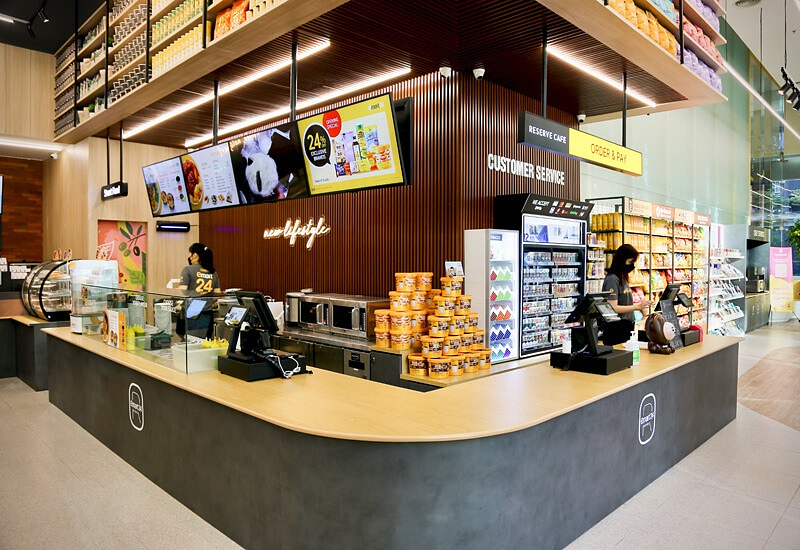
When asked if owning his own business was a dream or childhood ambition, Pang seems momentarily surprised and lets out a chuckle. “Quite frankly, I never imagined myself doing anything like this,” he admits. “I have two sons, aged seven and eight. When I was their age, growing up in the Mamee family, my path was already set. I was to join the family business.
"We only ever talked about business in our household, whether at the dinner table, in the office or even on holiday. Everything came back to that. I didn’t have the typical childhood ambitions my friends did — doctor, engineer, those sort of things — because from very young, we were taken to the factories to learn about the machines and jumped into sales vans to learn about sales. We were exposed to the business from birth, I guess you could say. I knew that after I graduated, I would work someplace else to gain experience and then join Mamee to help out. It was a simple decision.”
Not so much a decision and more a path he had been set on, from the sound of it, but while his time at Mamee had its highs, Pang is adamant about being hands-off when the time comes for his children to choose their own careers.
“I want them to have the flexibility in picking their own paths,” he says. “These days, who are we to tell our kids what they should be? If they want to be a YouTuber or gamer, what can we say? We are living in dramatically different times now. The jobs of the future are things we cannot even imagine yet, and what is common today might be irrelevant or non-existent in their time. Look at these young kids making millions of dollars from e-sports tournaments. It’s a brave new world out there.”
Technology will no doubt drastically shape the lives of his children, but Pang is determined that they also get to know the outside world. He actively tries to keep fit by golfing, playing tennis and running, but his young sons, like most of their peers, have a predilection for the indoors and their various screens.
“I try to force them to spend some time out of the house because they get so engrossed with their iPads,” he says, shaking his head. “They need exposure to things beyond gadgets. Once the world reopens, I’d like to take them hiking and camping more often. I don’t want to raise a couple of city kids who have never seen a real cow. And travel, too. We always bring them on our trips, and used to go on annual ski holidays in Japan, which they enjoyed.
“My kids don’t see me as often as they used to, so my wife tries to explain to them where I am and what I’m doing,” Pang continues. “They’ll say, oh daddy, you’re going to the shop. They haven’t yet been to emart24 but I’d like to take them when it’s safe so they can see what I do. It’s hard to make them understand why I’m not around as much, but I hope someday they will and all the sacrifices will pay off. As far as they understand, I work with yummy food. They think emart24 is a magical place full of snacks and goodies.”
The very impression he would like to give consumers, only adults have far higher expectations.
“Yeah! I wish it was as easy to showcase the wonder of this place [to the public] as it is with my kids,” laughs the CEO. “But I have no regrets. I feel very full and satisfied, I’m happy, even though it’s challenging. It’s something new and exciting, and I think everyone needs that spark to push themselves forward and see what they are capable of, and you can only do that when you are brave and take chances and try something new.”
Three hundred stores in five years, and he is only on the first lap, the starting gun still smoking.
“It’s a long, long road ahead,” Pang agrees. “I wish I could fast forward and skip the next five years to see where we end up and how we are doing, but I don’t want to miss the whole experience of putting it together. That’s really the exciting part, you know?”
This article first appeared on Sept 6, 2021 in The Edge Malaysia.


